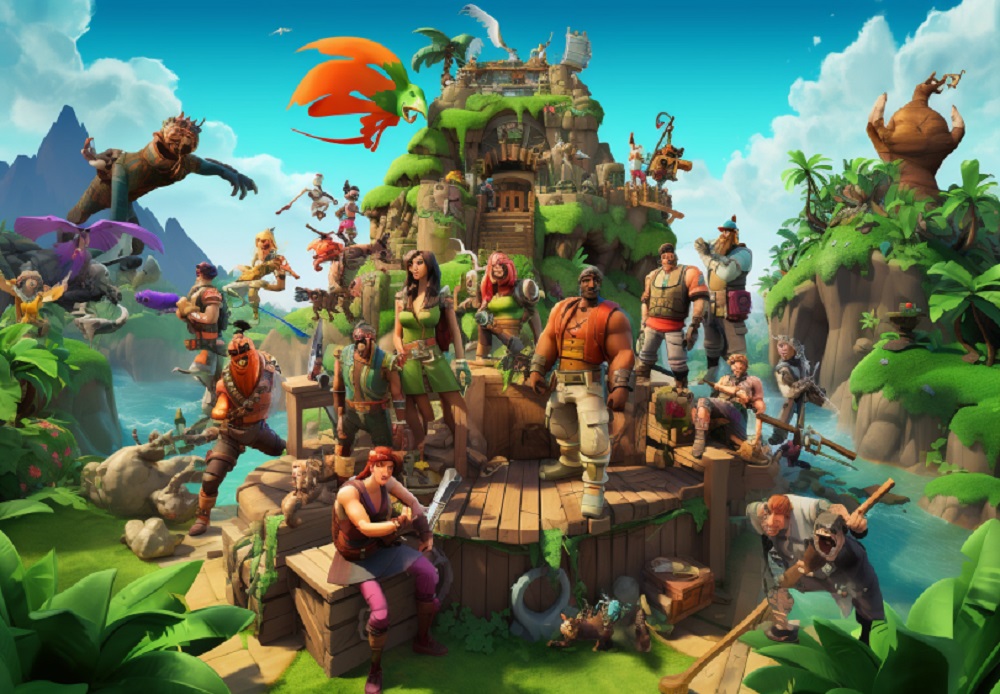An In-depth Overview of Gaming and Metaverse
Introduction
The gaming industry has undergone a significant transformation with the emergence of the Metaverse, a virtual reality space where players can interact with each other and the digital environment in real-time. This comprehensive article explores how virtual worlds within the Metaverse are revolutionizing the gaming industry. We will delve into the various ways in which the integration of the Metaverse is changing game design, player experiences, social interactions, and business models within the gaming ecosystem.
1. Understanding the Metaverse
1.1 Defining the Metaverse
The Metaverse is a collective term used to describe a network of virtual worlds that are interconnected, allowing players to seamlessly move between different environments and experiences. It is an immersive and interactive space where players can explore, create, and interact with other participants.
1.2 The Evolution of the Metaverse
The concept of the Metaverse has roots in science fiction and has evolved over time, influenced by advancements in technology and the growing demand for immersive digital experiences. The development of virtual reality (VR), augmented reality (AR), and mixed reality (MR) technologies has paved the way for the realization of the Metaverse.
2. Metaverse and Game Design
2.1 Player Agency and Creativity
The Metaverse provides players with unprecedented agency and creativity in game design. Players can become creators themselves, designing and building their own virtual worlds, levels, and assets. This shift from passive consumption to active participation blurs the line between players and developers.
2.2 Dynamic and Persistent Environments
Virtual worlds within the Metaverse offer dynamic and persistent environments. These worlds can change and evolve based on player interactions, creating a sense of a living, breathing ecosystem. Events, quests, and storylines can unfold in real-time, providing players with an ever-changing and immersive experience.
3. Social Interactions in the Metaverse
3.1 Multiplayer Experiences
The Metaverse enhances social interactions in gaming by enabling seamless multiplayer experiences. Players can connect with friends, join communities, and participate in collaborative or competitive gameplay across virtual worlds. This fosters a sense of community and camaraderie among players from around the globe.
3.2 Virtual Economies and Trading
Virtual worlds within the Metaverse often feature their own economies and trading systems. Players can buy, sell, and trade virtual assets, such as in-game items, skins, or currencies, creating a vibrant player-driven economy. This opens up opportunities for entrepreneurship and virtual asset ownership.
4. Business Models in the Metaverse
4.1 Free-to-Play and Microtransactions
The Metaverse has popularized the free-to-play model, where players can access games for free and choose to make in-game purchases. Microtransactions, such as cosmetic items or boosts, allow developers to monetize their games while keeping them accessible to a wide audience.
4.2 Play-to-Earn and Blockchain Technology
Blockchain technology and Non-Fungible Tokens (NFTs) have introduced the play-to-earn model in the Metaverse. Players can earn real-world value by participating in virtual economies, selling virtual assets, or engaging in play-to-earn games, where in-game achievements translate into monetary rewards.
5. Impact on the Gaming Industry
5.1 Game Development and Innovation
The integration of the Metaverse has spurred game development innovation. Developers are exploring new game mechanics, narrative structures, and design principles to leverage the unique capabilities of virtual worlds, pushing the boundaries of what is possible in gaming.
5.2 Collaboration and Cross-Platform Experiences
The Metaverse encourages collaboration and cross-platform experiences. Players can engage with games across different devices, including PC, console, and mobile, seamlessly transitioning between platforms while maintaining their progress and social connections.
6. Future Outlook of the Metaverse
6.1 Advancements in Technology
As technology continues to evolve, the Metaverse will undergo further advancements. Improved VR/AR/MR technologies, haptic feedback, and realistic graphics will enhance immersion and deliver more engaging experiences.
6.2 Integration with Other Industries
The Metaverse has the potential to extend beyond gaming and integrate with other industries such as entertainment, education, healthcare, and more. Virtual conferences, virtual classrooms, and virtual therapy sessions are just a few examples of the potential applications of the Metaverse.
7. Virtual Reality and Immersion
7.1 Enhanced Immersive Experiences
Virtual reality (VR) technology plays a significant role in the Metaverse, providing users with a heightened sense of presence and immersion. VR headsets and accessories enable players to step into virtual worlds, interact with objects, and engage with other players in a more realistic and immersive manner.
7.2 Impact on Gameplay Mechanics
The integration of virtual reality in the Metaverse introduces new gameplay mechanics and interactions. Players can physically move, gesture, and use motion controllers to manipulate objects or perform actions within the virtual environment, creating a more intuitive and immersive gaming experience.
8. User-generated Content and Modding
8.1 Empowering Player Creativity
The Metaverse empowers players to become creators themselves. User-generated content platforms and modding communities allow players to design and share their own virtual worlds, characters, and assets. This fosters a vibrant ecosystem of player-driven content, expanding the possibilities of the Metaverse.
8.2 Collaborative Creation and Curation
Communities within the Metaverse often collaborate on large-scale projects, building virtual cities, themed environments, and complex interactive experiences. Through collaborative creation and curation, players contribute to the overall richness and diversity of the Metaverse, creating a sense of shared ownership.
9. Virtual Events and Social Experiences
9.1 Virtual Conferences and Gatherings
The Metaverse offers a platform for hosting virtual conferences, trade shows, and social gatherings. Virtual event spaces can accommodate large numbers of participants from around the world, providing a cost-effective and accessible alternative to physical events.
9.2 Live Performances and Cultural Events
Artists, musicians, and performers are embracing the Metaverse as a venue for live performances and cultural events. Virtual concerts, art exhibitions, and theater productions bring people together in immersive and interactive experiences, transcending geographical limitations.
10. Security and Privacy Considerations
10.1 Protecting User Data and Assets
As the Metaverse relies on user accounts and virtual assets, ensuring the security and privacy of user data becomes crucial. Robust security measures, encryption protocols, and decentralized identity systems help safeguard user information and prevent unauthorized access.
10.2 Addressing Virtual Crime and Fraud
Virtual economies within the Metaverse are susceptible to fraud, hacking, and virtual crime. Implementing measures such as digital asset tracking, anti-cheating mechanisms, and community-driven moderation systems can help maintain a secure and fair gaming environment.
11. Education and Skill Development
11.1 Virtual Learning Environments
The Metaverse has the potential to revolutionize education by offering immersive and interactive virtual learning environments. Students can engage in virtual classrooms, simulations, and collaborative projects, enhancing their learning experiences and expanding educational opportunities.
11.2 Skill Acquisition and Training
Virtual worlds within the Metaverse provide a platform for skill acquisition and training in various fields. From flight simulations for pilots to medical training scenarios for healthcare professionals, the Metaverse offers realistic and safe environments to practice and develop specialized skills.
12. Ethical AI and Moderation
12.1 AI-powered Virtual Assistants
Artificial intelligence (AI) plays a vital role in the Metaverse, powering virtual assistants that enhance player experiences. AI-powered characters, non-player characters (NPCs), and chatbots interact with players, providing guidance, assistance, and engaging storytelling.
12.2 AI-driven Content Moderation
As user-generated content proliferates in the Metaverse, AI algorithms are employed for content moderation. Automated systems can detect and filter inappropriate or harmful content, maintaining a safe and inclusive environment for all participants.
13. Environmental Impact
13.1 Energy Consumption and Sustainability
The Metaverse, like any digital infrastructure, has an environmental impact. Increased energy consumption from server farms and the production of hardware can contribute to carbon emissions. Encouraging sustainable practices, renewable energy usage, and optimizing infrastructure can help mitigate the environmental footprint of the Metaverse.
13.2 Green Initiatives and Virtual Ecology
Innovative initiatives within the Metaverse focus on virtual ecology and sustainable practices. Virtual reforestation projects, eco-conscious virtual cities, and environmental education campaigns raise awareness about real-world environmental challenges and inspire positive actions.
Conclusion
The integration of virtual worlds and the Metaverse into the gaming industry has sparked a paradigm shift in game design, social interactions, and business models. With virtual reality, user-generated content, and immersive experiences, the Metaverse offers a vast and interconnected space for gamers to explore, create, and connect. However, it also presents challenges related to security, privacy, ethics, and regulations. By addressing these issues and fostering responsible development and use, the Metaverse has the potential to reshape not only the gaming industry but also various aspects of our lives, from entertainment and education to commerce and social interactions.






